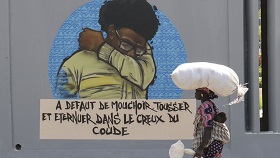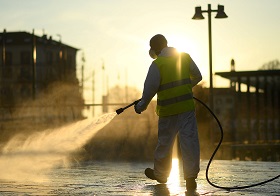Several weeks ago, as shocking images from Italian hospitals spread across the internet like wildfire, it became entirely clear that no state, no city and no one was safe from COVID-19. It was also at that time that there seemed to be one party missing from the news—Africa. Fast forward several weeks and we see that Africa, unfortunately, will not, in fact, dodge the bullet that is the novel coronavirus. Nonetheless, the situation on the continent seems to be developing differently from what we might have expected. While sceptics point out that Africa is in no way equipped to fight the virus and could be looking at an approaching humanitarian catastrophe, some experts have pointed out that the continent may not be as poorly prepared as earlier believed. As the world has already passed a million cases, Africa is looking at just over 9000 (according to the WHO on April 6, 2020).
In the article “Could West Africa’s experience with Ebola help it combat COVID-19?”, published on the Africa Portal and written by Jessica Moody, freelance political risk analyst and journalist, several important questions are raised. How can Africa’s experience in battling deadly diseases serve the continent now? How will the continent’s development challenges set governments behind in their race to reduce mortality rates? Is it actually possible to execute prevention measures when basic instruments, like social distancing, hand washing and lockdowns, are rather a privilege of the elite?
Several weeks ago, as shocking images from Italian hospitals spread across the internet like wildfire, it became entirely clear that no state, no city and no one was safe from COVID-19. It was also at that time that there seemed to be one party missing from the news—Africa. Fast forward several weeks and we see that Africa, unfortunately, will not, in fact, dodge the bullet that is the novel coronavirus. Nonetheless, the situation on the continent seems to be developing differently from what we might have expected. While sceptics point out that Africa is in no way equipped to fight the virus and could be looking at an approaching humanitarian catastrophe, some experts have pointed out that the continent may not be as poorly prepared as earlier believed. As the world has already passed a million cases, Africa is looking at just over 9000 (according to the WHO on April 6, 2020).
In the article “Could West Africa’s experience with Ebola help it combat COVID-19”, published on the Africa Portal and written by Jessica Moody, freelance political risk analyst and journalist, several important questions are raised. How can Africa’s experience in battling deadly diseases serve the continent now? How will the continent’s development challenges set governments behind in their race to reduce mortality rates? Is it actually possible to execute prevention measures when basic instruments, like social distancing, hand washing and lockdowns, are rather a privilege of the elite?
The author starts off by applauding Africa's efforts to prevent an outbreak similar to what we saw in the EU. The devastating effect of Ebola, which ravaged the continent in a way which majority of the world's population failed to comprehend, left Africa with an extensive arsenal of experience. As stated in the World Health Organization’s Ebola Situation Report from December 30, 2020, “a single Ebola outbreak in 2014–15 in West Africa resulted in over 11,000 deaths in Guinea, Sierra Leone and Liberia, with an estimated overall economic impact of USD 2.8 billion in the three countries." Additionally, it was estimated that had an appropriate response and sufficient funding been put in place, 80 per cent of the fatalities of that outbreak could have been averted. This lesson left scars, so African governments today are not keen on taking risks when it comes to COVID-19.
Precisely this explains many countries' willingness to shut down airports, close national borders and limit public gatherings. Contrary to the EU, where certain countries acted only after facing the consequences of a death toll in the hundreds, Africa acted fast. This might explain why the continent has been able to put off the rapid spread of the virus. Additionally, what might play to Africa's advantage is its young population. As of 2020, the continent has the most youthful population globally, with 60 per cent of the population under 25. Since the virus tends to take less of a toll on those younger, this could be important.
Yet all this is unlikely to be enough. Africa’s setbacks in fighting the virus are abundant and trace back to far more than just the continent’s underdeveloped healthcare system. These reasons include the booming urban population, the lack of decent social infrastructure and the fragile economic situation forcing many to continue working despite calls to stay home. These are important issues that change the way Africa will need to fight the virus. For example, the continent has the world’s fastest growing urban population, with the global share of urban residents projected to leap from 11.3 per cent in 2010 to 20.2 per cent in 2050. This creates high-risk agglomerations of people who are in constant close contact with one another. Adding fuel to the fire is the lack of clean water to enhance hygiene measures and help reduce the infection rate. No less important is that this time, the world might not be able to help Africa, as mentioned by Moody. Although the new pan-Africanist mindset foresees the continent fighting its own battles and paving its own path (especially when it comes to the economic and political domains), Africa has seriously benefitted from aid in times of epidemics. This time they might not be able to.
Additionally, the author refers to the possibility of other epidemics occurring on the continent, as well as underlying health conditions of a significant amount of the population, as factors that could cross out the effect of the continent having a younger population. In 2018, more than seven million South Africans were living with HIV (HIV leads to AIDS, which, in its turn, can cause immune system failure), while at the moment of this review being written, there were 1 655 confirmed cases of COVID-19 in the country (April 6, 2020). This combination does not allow to even the slightest of delays or negligence regarding measures introduced by the government.
Overall, there’s a lot at stake for Africa when it comes to COVID-19. The economies of some countries were set to achieve substantial growth in 2020, despite global economic stagnation. Whether or not that is still possible is unclear. With borders closing, Africa's dream of increased export and the creation of value-added chains has once again slipped away onto the back-burner. Whether or not the 2020 EU-Africa Summit is to take place is not yet clear. How exactly the continent is to continue the Phase II AfCFTA negotiations is another matter on its own. Even less clear is how interested other countries will be in investing in the continent's growth after collateral damage from the virus has been assessed.
Another issue that deserves attention within the COVID-19 conversation is whether or not Africa’s partners will be able to fulfil their past agreements and arrangements with the continent. The European Union, for example, which made notable investments in the development, stability and prosperity of the African continent for years, may not be able to keep up such assistance in the months, and perhaps even years, to come. As per European Commission records, EUR 21 billion worth of development aid was provided to Africa in 2016 by the EU and its member states. There are currently seven civilian and military missions being realized on the continent, while EUR 1.4 billion was funnelled into African educational programs 2014 to 2020. EUR 32 billion worth of investments in Africa were made solely by European companies in 2015. This makes up a third of overall foreign direct investment in the continent, which is a significant amount for a continent that is currently undergoing perhaps one of its most profound challenges in modern history. COVID-19 could change this.
Nonetheless, although the author ends the article with a realistic assessment of the hurdles ahead, it would seem that Africa doesn’t seem ready to give up without a fight.
M-Pesa, Kenya’s leading mobile finance service announced free person-to-person mobile transactions under 1000 Kenyan Schillings (approximately USD 10) for three months. Additionally, the country’s largest telecom company, Safaricom, implemented a fee-waiver on M-Pesa by the recommendation of the Central Bank and President Kenyatta. Nigeria’s Co-Creation Hub in collaboration with “Africa Centres for Disease Control and Prevention” (Africa CDC) announced their call for innovative communication projects on COVID-19. The goal is to counter misinformation, catalyze solidarity and combat stigmatization across semi-urban and rural populations around the continent. Additionally, the Pan-African e-commerce company Jumia granted African governments access to its last-mile delivery network to deliver supplies to healthcare facilities and workers.
We do not yet fully understand when exactly and how hard COVID-19 will hit Africa. Although, what we can suppose is that it will all depend on how far governments are willing to go to suppress the outbreak before it happens and how resilient both populations and medical facilities will turn out to be once it does. No less important, perhaps, is luck.






